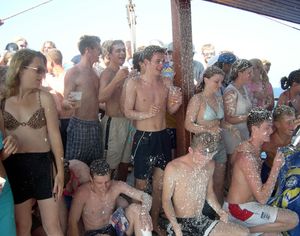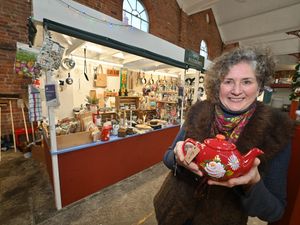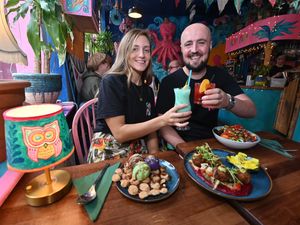Mark Andrews: Why it's time for The Apprentice to do the mid-life crisis
Remember Lottie Lion from The Apprentice? You know, the 19-year-old librarian who could start an argument in an empty room, and claimed to have 15 years in the music industry because she played the viola as a child?

Well, she's now given a tearful interview telling how her stint on the show has ruined her life, and how nobody showed any concern for her welfare after she left.
This really disappoints me, because in my mind she has taken my place. I would love to go on The Apprentice, I've wanted to go on it ever since I first watched it about 15 years ago.
I accept that it might not be quite as much fun as it looks on TV, and that being cooped up in a house with a dozen attention-seeking millennials bragging about how they 'have few weaknesses' and are 'not there to make friends' might have its down sides. But the truth is, given half a chance, I would be on their like a shot.
Now I realise that many people who go on these shows have no real interest in the end prize, and just see it as a way of achieving their 15 minutes of fame, and if possible carve out a niche as a z-list reality TV star. But for me it would be all about the challenges. The wheeling and dealing, the buying and selling, I would just love it. I'm one of those people who metaphorically kicks every ball. I watch every episode convinced that I could do better than those who are on there – which sometimes you have to say, isn't that hard – in my mind I'm haranguing the contestants to avoid the obvious mistakes they are making. Remember the exercise in Margate, when they got themselves into all sorts of knots coming up with a marketing campaign for the seaside town in Kent? That should have been so easy. All they needed was a moped, a Triumph Herald convertible, and a Diana Rigg lookalike in a headscarf, and there's your retro-cool campaign. A week in Margate takes you back to the Swinging Sixties. Simple.
The main thing that has prevented me from applying for the series – apart from the fact that my employer might have something to say about me going Awol for 14 weeks while I get monstered by Lord Sugar – is the fact that I've never really had a credible business idea.
At least I didn't until the 2019 series. While Lottie Lion was arguing about ice lollies and boasting that she had once worked in 'the UK's top wine bar', it dawned on me what would really make Lord Sugar and I our millions: Club 45-70.
Sometime back in the 1990s, as a reward for being reasonably competent in my job, I was offered the opportunity to spend a week on a Club 18-30 holiday with a view to writing a travel feature about it. At the time I just about snuck into the target market for this type of thing, and it was supposed to be considered a privilege to have been invited to do the job. So of course, I turned it down flat.
Back then, in my late 20s, I was mortified that somebody might have considered I would be even remotely interested in that sort of thing. Spending a week with a load of inebriated chavs drinking cocktails off each other's belly buttons, or whatever it was they did. It didn't bear thinking about.
But now, when I really ought to be old enough to know better, I think I'd be right up for it. And I suspect I'm not alone.
When Club 18-30 closed in 2018, it was suggested that young people today are more interested in taking pictures in exotic locations than in getting trollied at a foam party in Ibiza, and I do sort of recognise that. The poet Frieda Hughes, daughter of former poet laureate Fred Hughes, once wrote a poem about the strange culture where young people flock to some of the most wonderful sights in the world, and then stand with their back to them while they're taking selfies. It does seem rather strange.
Similarly, prior to lockdown, if you ever visited the surviving 'young people's venues', the places that used to be packed to the rafters with raucous young people back in the 1980s and 90s, you will find that these days there is one demographic that is conspicuous by its absence – young people. Many of these places are long gone, of course, or have been transformed into trendy gastropubs, craft-beer outlets, or those strange coffee shops where people pay about £15 for a thimbleful of Kenco served in a funny-shaped glass.
But the ones that have survived... they have a sort of turned into museums of popular culture, preserved in aspic for decades. So many of these places have been untouched by time: same decor, same DJs, same playlists, the same punters wearing pretty much the same clothes as they were 30 years ago. There is no shortage of Wayne Lineker lookalikes whose idea of a night out is a few pints of Bass creamflow, bopping along to a bit of Harold Melvin or Roy Orbison. And good for them, at least they look to be having fun.
I'm convinced the mid-life crisis will be one of the great growth markets of the next few years. While Lottie Lion's generation will spend all its money on student fees, avocados and bottled water, there will be millions of 40, 50 and 60-somethings with an insatiable desire to pull on some stonewashed denim and bop along to the Birdie Song at a shabby nightclub in Benidorm.
Time to draw up my business plan...





